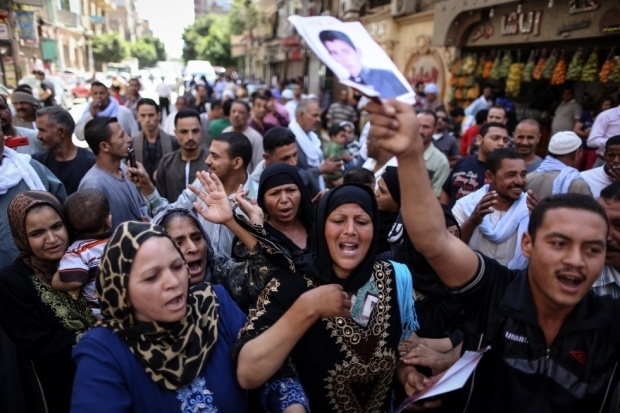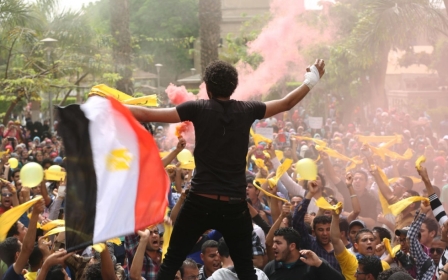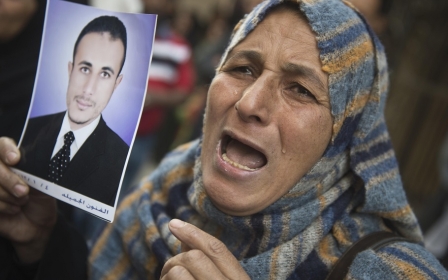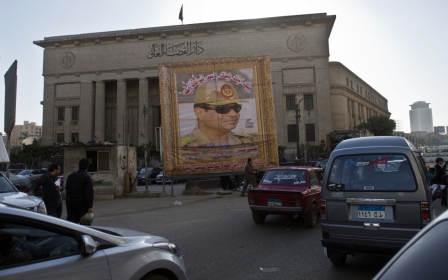UK ex-chief prosecutor slams PM's 'hypocrite' Egypt policy

A former director of public prosecutions in the UK has called Britain's policy towards Egypt and its Muslim Brotherhood group as "spectacularly cack-handed", warning that such approach does more harm than good in countering extremism.
In an opinion piece for The Telegraph on the eve of the anniversary of Egypt's military coup, Lord Macdonald of River Glaven QC writes that Whitehall's investigation of the Muslim Brotherhood gives "mixed messages" to the country's young Muslims.
Lord Macdonald argues that it would be difficult to seek engaging Britain's Muslim youths in democracy at home when their government is supporting authoritarian regimes abroad.
"It would be a great mistake to think that this sort of double standard goes unnoticed, or that it doesn’t play its full part in the disillusionment and chaos seen in places like Iraq. In the modern world, you can’t be a hypocrite in secret," he wrote.
Headed by Sir John Jenkins UK ambassador to Saudi Arabia, the investigation was ordered in March and will look into whether an attack on tourists in Egypt was organised by Brotherhood members in Britain.
The Brotherhood have denied the group engaged in, or promoted, acts of violence, and have engaged Lord Macdonald for his legal services.
In April, Macdonald and a team of lawyers working on behalf of the Brotherhood asked Africa's highest judicial authority to urge Egypt to suspend the mass death sentences of 529 Egyptians, many of whom are Brotherhood supporters.
They were accused of various crimes related to an attack on a police station in Minya that resulted in the murder of a police officer in August 2013. The attack occurred during riots in the aftermath of the dispersal of the Rabaa sit-in, the day police killed hundreds of Morsi supporters in Cairo clashes.
Since their communique with the African Union's Commission on Human and People's Rights, the sentences of 492 of the defendants have been commuted to life imprisonments. Thirty seven are still sentenced to death.
Another 683 Egyptians, accused of their involvement in the murder of two policemen and the attempted murder of five others in Minya also in August 2013, were also sentenced to death in late April.
On 21 June, a Minya court confirmed the death sentences for 183 of the convicted, including Muslim Brotherhood chief Mohamed Badie, in that case, commuting the other sentences to life imprisonment.
In his piece on Wednesday, Macdonald said that while the UK government can "review anything it wants", it has failed to acknowledge that the Brotherhood's Freedom and Justice Party were overthrown in a military coup after winning a free and fair election.
"Democracy had come at last to Egypt, but when the army kicked it down, we didn't hear too much gnashing of teeth in the citadels of freedom in the West," Macdonald wrote.
"To cast the democratic victims of violent military overthrow as a threat, even as you [are] building bridges to the generals who deposed them, is hardly a commitment to people struggling to build democracy in tyrannies abroad," he wrote.
"And when the objects of such calculation happen to be democrats who are also Muslim, you'd better wear a hard hat when you go preaching parliamentary values in parts of East London or Bradford."
New MEE newsletter: Jerusalem Dispatch
Sign up to get the latest insights and analysis on Israel-Palestine, alongside Turkey Unpacked and other MEE newsletters
Middle East Eye delivers independent and unrivalled coverage and analysis of the Middle East, North Africa and beyond. To learn more about republishing this content and the associated fees, please fill out this form. More about MEE can be found here.




